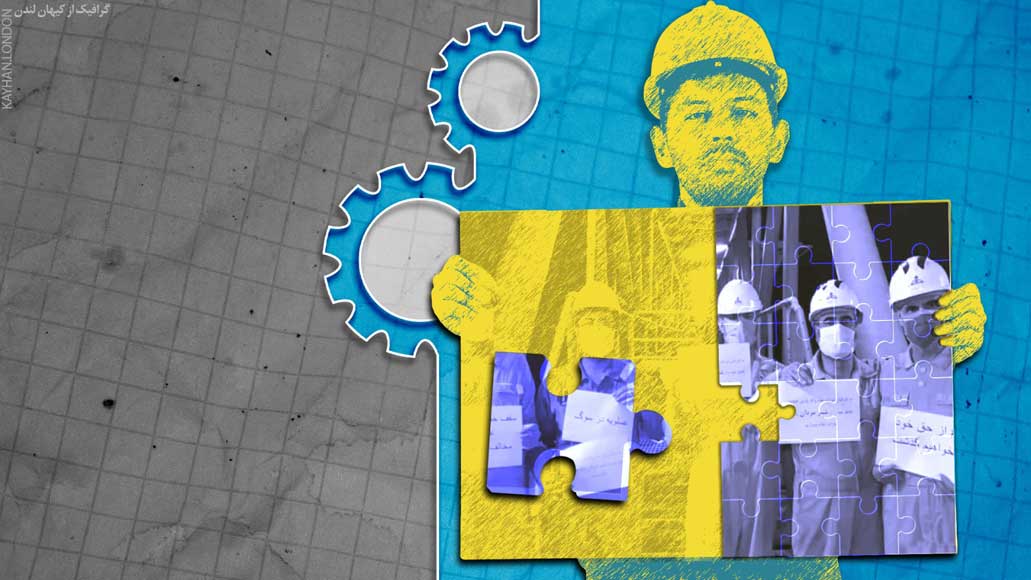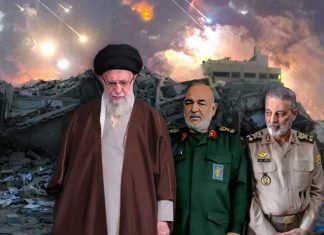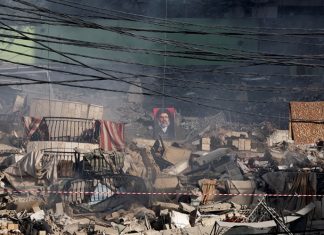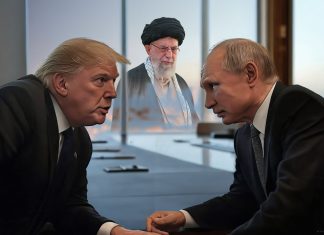A nationwide strike by Iranian oil workers on fixed-term contracts — which started a day after the June 18 Iranian presidential elections — has spread to 114 oil, gas, and petrochemical companies and entered its fourth week.
Workers from 15 companies subcontracted by the Iranian Oil Ministry to hire skilled and unskilled labor started the industrial action, which has gained momentum in the past three weeks.
Workers in various parts of Haft Tapeh Sugar Cane Mill Labor Syndicate were the latest group to join the strike on July 13, making this the most extensive industrial action to date by the country’s oil workers. The strike is mostly likely to spread to other sectors of the Iranian economy, including the manufacturing and service industries.
Companies under contract with the Iranian Oil Ministry currently employ some 100,000 workers in various industry sectors, including facilities, production, storage, distribution, and repairs. These companies and the Oil Ministry have ignored workers’ demands for higher wages, better work conditions, job security, and benefits.
Most of the companies, which hire workers, receive government subsidies. They are reportedly subsidiaries of Khatam-al Anbiya, the Islamic Revolutionary Guards Corps (IRGC) engineering wing, or owned by family members and friends of senior state officials.
Many labor activists believe that the Oil Ministry decides which companies get lucrative oil, gas, and petrochemical contracts before putting them out for tender. They say the result of any bidding process is determined in advance, meaning companies do not win a tender based on capabilities and previous records but through their connections and payoffs. They say that this corrupt bidding process has enriched the regime’s insiders to the detriment of thousands of workers, technicians, and engineers in the oil industry.
Striking oil industry workers’ principal demand is to have the same working hours and the same number of days off as workers with permanent contracts. The demand, known commonly as “Twenty-Ten,” is the primary concern of the oil workers on fixed-term contracts. While they get six days off for every 26 workdays, the workers on permanent contracts get 10 days off for 20 workdays.
Most oil industry workers on fixed-term and permanent contracts who work in refineries or oil and gas fields live in cities and towns far from project sites. Workers on fixed-term contracts say they spend two of their six days off traveling to and from their homes. They only spend four days a month with their families and take care of their affairs at home.
Workers also highlight that their salaries and wages are not adjusted according to the actual cost of living. They argue that their pay does not reflect their stressful work conditions, including 12-hour shifts outdoors in southern Iran, where temperatures reach 50 degrees Celsius every day for six consecutive months.
The striking oil industry workers have also called for an end to fixed-term (temporary) contracts. A large segment of the workforce, particularly laborers, are on fixed-term contracts, either for one month or 89 days, which the employer renews. Under Islamic Republic Labor Laws, workers on fixed-term contracts of fewer than 90 days are not entitled to unemployment benefits and have no legal recourse if employers decide not to pay their wages.
Fixed-term contracts pose a severe problem to a large segment of the workforce, some 100,000 of whom are active in the oil industry. Workers on fixed-term contracts lack job security and can be fired without prior notice. They also have no legal recourse to demand back pay. They are at the mercy of their employers.
Striking workers also demand that their salaries and wages be paid on time. They also want job security and benefits. Sometimes, employers owe up to one year of salaries and wages in back pay to oil industry workers on fixed-term contracts. Companies that hire workers on fixed-term contracts cite the government’s delay in compensating them as the main reason for their inability to pay workers’ wages on time.
The striking oil industry workers on fixed-term contracts also want to form labor unions. Since its inception 43 years ago, the Islamic Republic has banned independent labor unions and instead created the state-sponsored “Islamic Labor Council.” The council does not protect the rights of workers but functions as a propaganda tool for the regime. The judicial and security forces have harassed and pressured independent labor activists in the past four decades.
Many domestic trade unions have supported the striking workers, including Haft Tapeh Sugar Cane Mill Labor Syndicate, Syndicate of Workers of Tehran and Suburbs Bus Company, Association of Retirees Union, Coordination Committee for Establishing Trade Union, Union of Eslamshahr Cultural Association, Retirees Alliance Group, Union of Aligudarz Cultural Association, Union of Kurdistan, Saqqez, and Ziviyeh Cultural Association.
EXCLUSIVE: Kayhan Life Interviews Iran’s Striking Oil Workers
Many others have released statements of support. They include the Tehran-based Defenders of Human Rights Center, lawyers practicing in Iran, the families seeking justice for their loved ones who were killed during the nationwide protests in November 2019, and many civil rights activists, including the Crown Prince Reza Pahlavi.
On June 27, the Energy Committee of the Majlis (Iranian Parliament) held an emergency meeting with senior officials at the Oil Ministry, the Planning and Budget Organization, and the General Inspection Office to discuss recent events. However, instead of addressing the striking workers’ demands, the committee only reviewed issues raised by oil workers on permanent contracts.
Speaking to reporters after the meeting, Mr. Zanganeh said the striking contract workers’ demands were “extrajudicial,” arguing that their wages and work conditions were in line with the labor laws.
The outgoing President Hassan Rouhani echoed Minister Zanganeh’s remarks.
Mr. Rouhani, who mostly had remained silent on strike by the oil workers on a fixed-term contract, on June 30, said: “If they [oil workers] have a problem, I will direct the minister of labor to address these concerns and resolve them. However, their concerns have nothing to do with the oil sector. Some of them only work in regions with oil production.”
“Nowadays, there are discussions in some parts of the country about workers in the oil industry, especially those who work under extreme conditions. The government is aware of this issue.” Rouhani added. “The budget law has encountered a problem this year. I promise the honorable workers in the oil industry that we will solve their problems.”
According to several labor activists, agents from the state’s security agencies have infiltrated industrial action, creating divisions among striking workers and trying to destroy the unprecedented nationwide labor movement.
The council organizing and coordinating demands by oil industry workers on fixed-term contracts has released several statements in the past three weeks, warning that workers will continue the industrial action until all their demands are met. The council has said that minor concessions by the government will not persuade the workers to end the strike.








